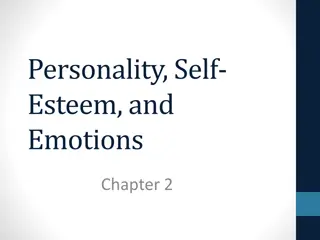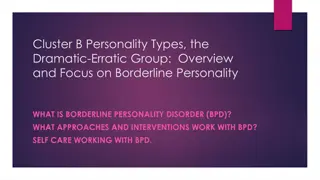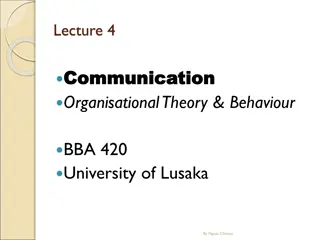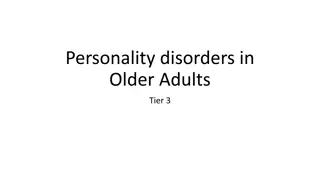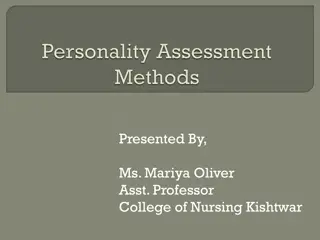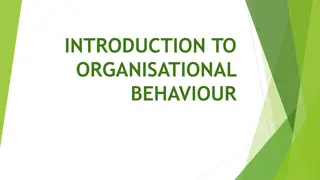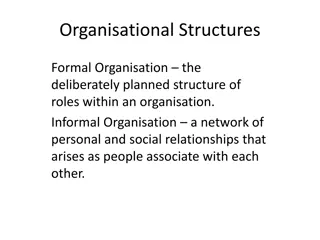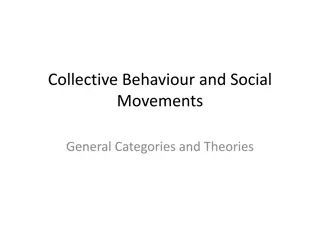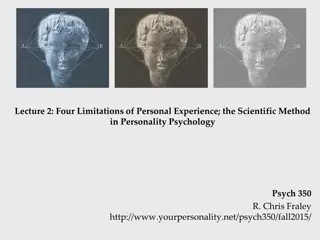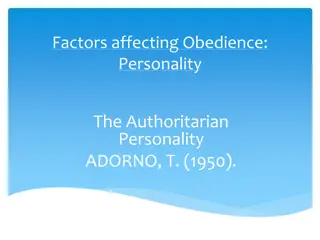Understanding Organisational Behaviour and Personality in the Workplace
Organisational Behaviour (O.B.) focuses on studying human behavior within organizations and its impact on performance. It provides insights at individual, interpersonal, group, and inter-group levels. O.B. helps in controlling and directing behavior, emphasizing leadership, communication, organizational climate, and adaptation. Personality is described as an organized system of behavior, attitude, and values that shapes an individual's functioning in their environment. Different definitions of personality highlight its role in adjusting to the environment and understanding oneself.
Download Presentation

Please find below an Image/Link to download the presentation.
The content on the website is provided AS IS for your information and personal use only. It may not be sold, licensed, or shared on other websites without obtaining consent from the author. Download presentation by click this link. If you encounter any issues during the download, it is possible that the publisher has removed the file from their server.
E N D
Presentation Transcript
ORGANISATIONAL BEHAVIOUR
Importance of Organisational Behaviour O.B is concerned with the study of how and why people behave in the organisation and also how their behaviour affects the performance of the organisation.
O.B Provides an opportunity to the management to analyze human behaviour Prescribed at Four levels a)Individual levels : How and why individuals behave in a particular way. b) Inter personal levels : Superior and subordinate relations, ones peer or group or association. (though it is inevitable in organisation, but it effects efficiency) c) Group level : Individual behaviour is modified by group pressure.
d) Inter group level : Different groups includes work group, unions, departments relations between groups organisational objectives . On the other hand even competitive relationship helps to achieve organisational objectives , only if there is a positivecompetition. etc. helps Co-operative to achieve
Controlling and Directing Human Behaviour By the use of power and sanction (to attain individual and organisational goals) Leadership (Success and unsecess of organisation depends on effective leadership) Communication (effective managers must be effective communicator) Organisational Climate (Total organisation structure) Organisation Adaptation (Adapt to changing real life situations)
Personality Derived from Latin word Personare which means to speak through . It means external behaviour like charm, dress appearance, attractiveness etc. Personality is a organised system of behaviour, attitude and values that characterize an individual and account for a particular way in which they function in an environment.
Definition According to Hilgard Personality may be understood as the characteristics pattern of behaviour and modes of thinking that determine a person s adjustment to the environment . According to Ruch Personality can be described as how he understands and views himself, and his pattern of inner and outer measurable traits .
Determinants of Personality Heredity : (qualities transferred from parents to childrens) Environment : a) Cultural Environment (Value for hard work, family closeness) b) Home Environment (Elders serves as models for youngsters) c) Socialisation (Social groups friends, peers, work groups etc)
Situation: (People behave differently in different situations) Conclusion : All the above determinants affect individuals personality in one or the other way .




